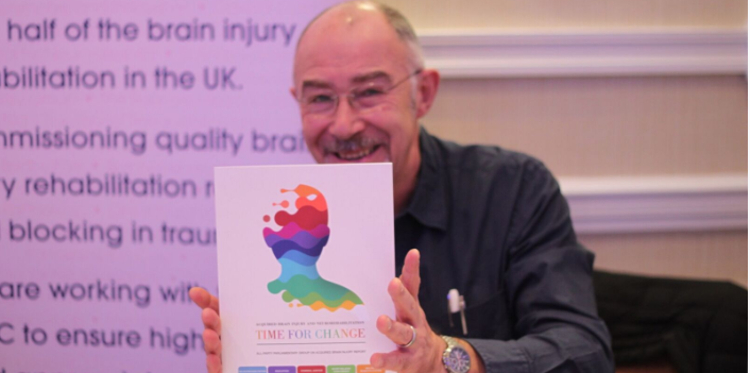
The conference brought together leading experts in acquired brain injury (ABI) to present the latest innovations in clinical practice and delivery, attracting a range of exhibitors and a diverse mix of delegates interested in and/or involved in the care of individuals with ABI. The conference provided an excellent learning environment for delegates to support their continuing professional development, with plenty of opportunities for questions and networking.
Professor Nick Alderman (Clinical Director, Neuropsychological Rehabilitation Services, Elysium Healthcare) commenced proceedings by reviewing how self-monitoring training (SMT) can be an effective strategy for individuals considered ‘treatment resistant’ to standard rehabilitation techniques. Following a model based on ‘response-cost’ delivered in an inpatient setting, he proceeded to outline a practical programme involving SMT, reinforcement and goal setting that could be utilised in the community. Positive reductions in target behaviours were demonstrated through a series of case studies, with gains showing both longevity and generalisability.
Dr Jessica Fish (Clinical Psychologist, St George’s University Hospitals NHS Foundation Trust) took the stage next to discuss the rehabilitation of confabulation following ABI, sharing the journey of a brain injury survivor as they struggled to separate their dreams from reality. Dr Fish presented an informative and detailed overview of potential rehabilitative strategies for confabulation, emphasising the importance of not directly challenging the individual but helping them to independently identify reality versus confabulated information. Dr Fish also shared her progress with a systematic review of treatment for confabulation and encouraged continued sharing of best practice to support rehabilitation efforts.
The next speaker was Louise Smith (Hospital Director, Elysium Neurological) who shared her experiences and observations of being a manager in a neurobehavioural setting, along with its triumphs and challenges. Specifically, she explored the pitfalls of multidisciplinary team working, presenting a ‘Transdisciplinary Team’ (TDT) approach as an alternative. She explained how TDT working requires ‘buyin’ from all disciplines that are all jointly responsible for delivering services to clients, comprehensive training, effective induction procedures for new staff, and the creation of a shared ethos. Whilst resource intensive and not without challenges, she explained how the TDT approach is ultimately structured around making the client the centre of service delivery – a message wholly welcomed by all in attendance.
Dr Giles Yeates (Clinical Neuropsychologist and Tai Ji instructor, Neuro Flow www. neuro-flowgroup.com) presented an engaging and interactive session on the inclusion of Tai Ji in rehabilitation, with delegate’s practising cloud hands and observing impressive demonstrations. He explained how traditional talking therapies may not be suitable for everyone, advocating for a mind-body approach as an alternative. The importance of experiential experiences, flow states and liminal experiences were discussed, as well as the evidence base for the benefits of Tai Ji for achieving simultaneous physical and psychological gains in complex health conditions. Following his presentation, many delegates expressed the desire to incorporate such approaches into their work.
After lunch, Dr Mark Holloway (Brain Injury Case Manager, Headfirst) presented ‘Case Managing the Environmentally Governed in the Ungovernable Environment of the Community’. Drawing on his extensive experience, Dr Holloway provided a compelling and honest account of the everyday challenges that accompanies such work. Illustrated via a series of case studies, he explained how the community is not a locked environment (and never will be), how case management is based in the “messy reality of society, family and home”, and how there are multiple service (e.g., a naively applied social model of disability), practical (e.g., fluid and fast moving environment; staff needs) and human (e.g., burn-out; conflicting needs of parties) barriers to successful community management. Dr Holloway concluded his talk by reviewing what case management looks like when it works, emphasising the importance of having a supportive team (absence of blame, presence of care) with a responsive, flexible and common goal, strong leadership, the ability to ‘ride the storm’ whilst being prepared to act decisively if risks or the environment is unmanageable, and recognising and valuing the role of support workers who are on the ground dealing with complex challenges on a daily basis.
The next speaker was Dr Richard Maddicks (Consultant Clinical Neuropsychologist, Psychology Chartered) who discussed why relationships matter in neurorehabilitation. His engaging talk emphasised how social isolation can be the most profound life change for people following ABI. He proceeded to explore a range of topics, including how the decision-making process can be a binding activity, family member’s appraisal of stress, the core components of interpersonal therapy, and relationship stability and quality after ABI. Dr Maddicks also highlighted the importance of bringing together the knowledge and experience of clinicians and family members, as well as presenting a manifesto for ‘putting the social into rehabilitation’.
The conference was drawn to a close by Joanna Humphreys (Music Therapist, Nordoff Robbins) who could not resist the opportunity to make some music – delegates made a fine choir with impressive body percussion skills! She proceeded to present a moving case study of an ABI survivor’s journey through music therapy, illustrating how they channelled their emotions through music, highlighting the anger and bitterness felt in contrast with the certainty, beauty and safety of music. As a result, there was not a dry eye in the house.
Save the Date: Next year’s conference will take place on 25 November 2019, Swansea UK.